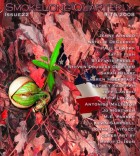“She names her new dog Molecule after the neighbor, a biotech engineer, names his dog Molecule. She is always doing things like that, replicating someone else’s brainy idea.” So begins, “Breathing Oysters.” The wonderful originality of your own ideas (they never seem to replicate others’ ideas) forces me to ask, “How do you do it?” How do you keep coming up with original idea after original idea? Who or what acts as your Muse?
I stole Molecule from a neighbor. The real Molecule is a teeny barking dog that rides on the dash in front of a Miata driver. I don’t know how they don’t crash. I just told my other neighbor that she is my Redheaded Muse. Seems like almost daily when we’re walking our dogs, I say something like “Hey, don’t let me forget that—a dog named Molecule. Molecule deserves a story.” I don’t know how it works really: there are people you feel clever around and people you don’t. She’s just one muse. My son and his dad are two more. My brother is good for dialogue and doesn’t even know it. He’s ranting about something and I’m thinking, hey, I have to use that line.
Those twelve gasps from the refrigerator led to one great gasp from this reader. A great example of the inevitable and the surprising in an ending. When did you realize that those gasps would be heard?
What a funny question! I didn’t know oysters were alive until a couple of weeks before writing this story. I just figured they were like wrapped-up salmon or an uncooked steak. When I found out oysters were living, it sort of tantalized me. At the same time, I felt conscious of additional lives in our house. I think the gasping part just sort of wrote itself in. How did that happen?
How is “molecule” central to this piece?
Molecule is the last straw. Molecule is so unique, her copying of the name will stand out as very dysfunctional. As if wearing the same underwear and buying the same items of relatives isn’t already weird, this is something that is going to tip the edge.
You are finishing up your stint as the SLQ fellow and joining the staff. What will you be taking with you from your fellowship, beside the fellowship of the SLQ staff?
They said I could keep my coffee cup and one red pencil.
Because of this experience, I’ve been turned on to a lot of excellent writers via Zoetrope. Many are supportive, tough, and fiesty. I’m sure someone will call me on that statement, and then
I’ll have to explain myself. I think the fellowship itself has been a growth experience for me—cutting out anything unnecessary in my flash, and really getting down to each word. The fellowship SLQ staff have been tremendous.
Begin this answer with the words, “I write.” Complete the sentence. Then, write as many sentences as you’d like, each one beginning with that “I write….”
I write…I write…I hit my head on the wall…



 The SmokeLong Grand Micro Contest (The Mikey) is now an annual competition celebrating and compensating the best micro fiction and nonfiction online.
The SmokeLong Grand Micro Contest (The Mikey) is now an annual competition celebrating and compensating the best micro fiction and nonfiction online.